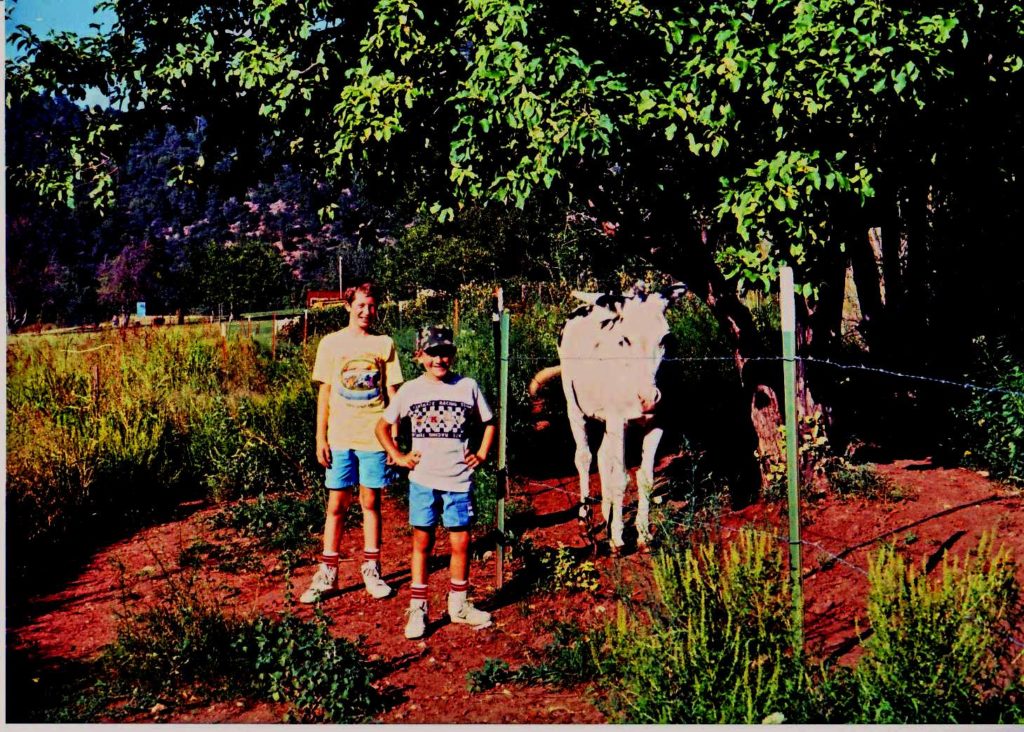| Two boys and a cow, Strawberry Arizona 1989 |
Another example goes this way: some people arrived at church lamenting their lack of fuel meant for their home’s heat. Hearing this, the Pastor offered to buy them a tank of fuel out of his own pocket money. The answer came back, ”I think were OK, it’s not that cold.”
Now, these persons desperately need fuel, but they cannot take the personal charity. Why? Repayment-threat pressures them? The idea of repayment could have become the loathsome hang-up, though reimbursement remained unasked for. But, more than mere repayment possibilities, we discern the much-too-personal part of this deal as the real issue. Folks maybe don’t mind so much receiving money from an institution, as it remains impersonal. In contrast, the demonstration of love, caring, and sacrifice from a real person, burdens them too much.
What is the point? Well, a will, healed and emancipated, always makes the right choice, all hang ups removed. Not any choice will suffice, since the whole free will idea enables man not just to choose, but to choose the right way; (in the above case, toward receiving from God and God’s man). A bound-up-will inverts, and heads toward the opposite of healthy, and self destructs with its choice. In contrast, a truly uninfected will always chooses God, His provision gaining.
This explains why God’s healing progression in the Bible; starting with conscience awakened, and next, a Divine covering and life replenishing, must restore the free will of man, as a mark of redemption.
Free volition was God’s first institution, a gift to mankind, established in the Garden of Eden. This free will gave way to a tree, in which good or evil became the opposite of life. So, in going forward, people thought the tree of the knowledge of good and evil epitomized free will. Kicked out of the garden, the tree of life option vanished from view. Real free volition was lost.
When a man digresses, exercises his self-preserving option, and enters self-protection’s repressed state, his lost will manifests itself. This will, negatively situated, surrenders its sovereign purpose, which simply stated is; to choose life, which keeps him immersed in God’s complete liberty and protection. So, in our example, the will to receive a much needed gift, had no choosing freedom or safety.
Instead, these persons used their lacking volition to spurn the generosity by default. They have negative, (self-destructive), tendencies like 1Sam15 teaches. This sounds harsh but truth doesn’t lie. God’s gracious nature heals and secures freedom, because the Bible tells us so. Noah found grace in the eyes of The Lord. So can we.
As the fuel-rejecters reacted negatively instead of responding positively, so does mankind’s best. The crux of what’s needed to heal them gets pushed away and defended against. Again and emphatically, the conscience awakened, must receive grace, (undeserved or unearned favor), which liberates the receiving-from-God will, or the prodigal son still lies in his self-imposed pigpen.
So, lets reconstruct our story this way; The family needs fuel and asks the church. The church can’t do it, but the pastor extends his generosity to them. They hardly know him, but he is offering something to them. Surely, they think, he must want a repayment. He doesn’t however, and this is disturbing. What could he be up to? Pure unconditional generosity to a fellow human in trouble?
This time they are very moved by the act of unconditional love and humbly receive the gift. Good works or evil works have not a say here, the idea of cause and effect blows up. They leave that tree behind to open to another, life.
Friends, we have social institutions and excessive governmental handouts in society perhaps, because of the fallen will’s propensity away from the unmatched generosity of a caring loving God. Some say we have a right to choose, and I say, their choice, though a given option, is not God’s free volition unless they can receive from that God who gives true freedom, through unconditional love.

